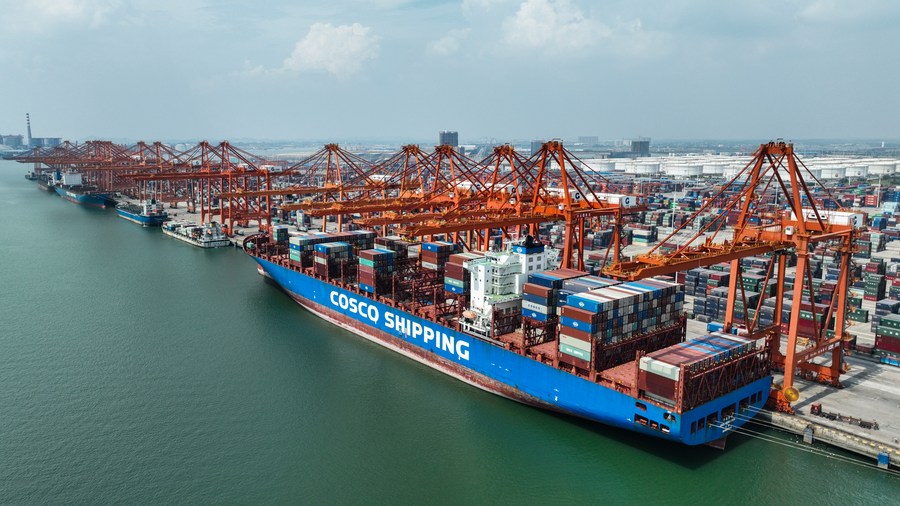Research: Chinese enterprises continue 'going global'
- By Zhang Rui
 0 Comment(s)
0 Comment(s) Print
Print E-mail China.org.cn, October 4, 2022
E-mail China.org.cn, October 4, 2022
Despite the uncertainties and challenges in the global market, more Chinese companies are actively promoting globalization strategies, according to a report recently released by the Ireland-based multinational professional services company Accenture.

Since China's outward foreign direct investment flow ranked No. 1 in the world for the first time in 2020, the country's foreign investment has remained stable, showing the characteristics of accelerated "going global." This is especially evident among private enterprises, as well as the priority given to investment in the advanced manufacturing and technology fields. In Accenture's survey, 95% of the 112 Chinese "going global" companies surveyed believe that the growth of their overseas business will exceed 5% in the next three years.
The report, the 2022 Accenture Chinese Enterprises Going Global Research, indicates that there are three key drivers for Chinese enterprises in going global: First, 92% of enterprises surveyed believe that globalization is the necessary path for Chinese enterprises to maintain fast growth. Second, 55% said they are promoting operational resilience, so that they can optimize resource allocation and build up supply chain resilience. Third, 49% are aimed at boosting innovation. As R&D resources in frontier technologies are distributed all over the world, leading Chinese enterprises have been deploying innovation centers globally and trying to learn and acquire innovative resources and experiences from overseas.
Yue Bin, operations lead for Accenture Greater China, said that China is steadfastly pursuing an open policy under the guidance of the Belt and Road Initiative and the dual circulation strategy, which has firmly inspired Chinese companies to go global. "Advanced manufacturing, technology platforms and health care are the main industries for China's overseas investment now," he explained. "These industries are very competitive and innovative. And so, we believe that in the future, the trend that China will continue to open up and advocate globalization is unchanged."
The report used a four-stage method to rank the level of internationalization displayed by Chinese companies based on overseas revenue proportions - initial stage, growth stage, established stage and fully globalized stage. Data shows that 32% of Chinese enterprises are still in the initial stage of globalization, with overseas revenue accounting for less than 10% of their total. However, 26% of enterprises are also in the established stage, a significant number, whose overseas revenue accounts for 20%-50% of their totals.
Yue Bin said most Chinese enterprises will choose markets in the world according to their industry attributes. For example, energy companies are inclined to choose South Africa and Brazil, internet enterprises prefer to expand their presence in Southeast Asia, and services and trade companies tend to look to the European market. "The strategic choices of companies 'going global' are value oriented, and they will check the maturity of local infrastructure and supply chains," he explained.
But there are some pain points and challenges that are hindering the development of Chinese enterprises' overseas business. First, 82% of surveyed companies said there are high risks of various laws, regulations and rules and high compliance requirements in every region. Second, 55% said it is hard to integrate: cultural differences and communication barriers seriously impede local integration and operating efficiency. Third, 41% admitted that management poses difficulties, with a lack of effective management to ensure efficient implementation of local projects. Fourth, 38% of companies pointed to low resilience: lack of flexibility and agility with supply chains and raw material procurement. And finally, 38% noted a lack of systems and disorderliness, with big differences and high complexity among regional operation models.
The report by Accenture suggests key reasons for the pain points. Of the companies surveyed, 74% said it is because of a lack of a global operating system, and 58% said lack of mindset for global ecosystem, and difficulties in bringing out the supply chain capabilities built in China overseas. Meanwhile, 54% noted a lack of focus and preparation regarding global strategy, as some enterprises pay too much attention to short-term earnings while ignoring long-term investment and development.
Accenture also proposed several key imperatives for Chinese enterprises going global. These include setting up top-down synchronous global strategies, establishing set operational models and restructuring organizations to fit the models, as well as building up a suite of globalization capabilities.
"In the past, when Chinese enterprises expanded their overseas business, they usually went out first, and then continued to make improvements," Yue Bin said. "Now, enterprises need a global strategy perspective. When their products and services 'go global,' or compete with foreign enterprises, they should first set up the supply chain, management system and other global capabilities, then they can go global in a more reliable and faster manner."






Go to Forum >>0 Comment(s)